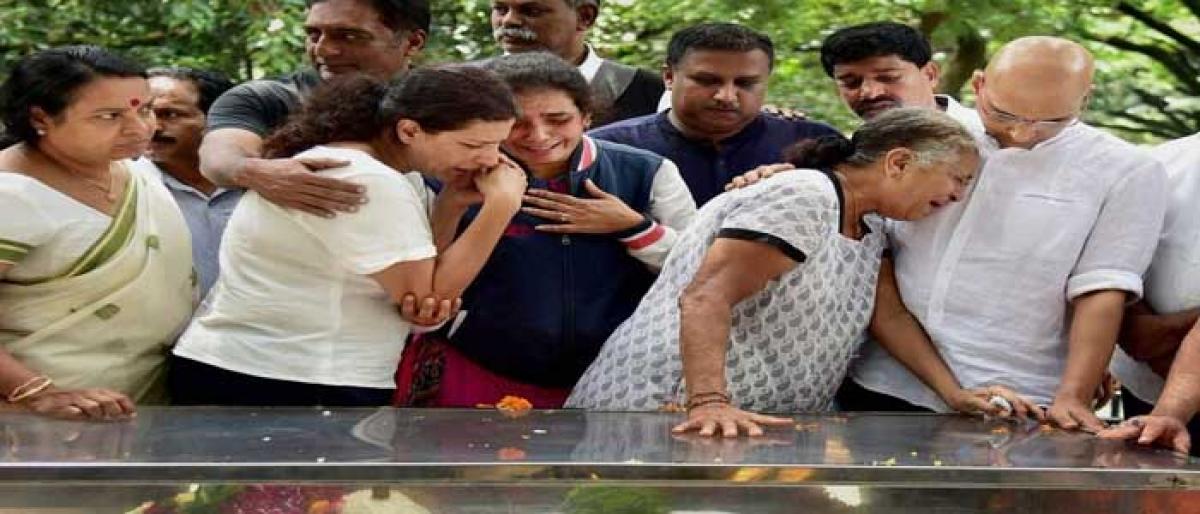Live
- Film director Ram Gopal Varma evades police questioning
- MyVoice: Views of our readers 26th November 2024
- MoU signed to implement NeVA project in AP Assembly
- Climate Change: Trump 2.0 Is Not A Fluke
- Disinformation & Disempowerment: How women’s basic rights and freedoms are being eroded all over the world
- Mahila Meekosam launched for protection of students, women
- COP 29: Rich Nations Have Their Say
- Industrial parks to be set up in every constituency
- Edu institutions to receive fee reimbursement soon
- SP orders speedy disposal of PGRS petitions
Just In

Senior Kannada journalist and social activist Gauri Lankesh was laid to rest with state honours here on Wednesday, even as the killing of the journalist provoked outrage and anguish across the country with thousands protesting what they saw as an effort to silence a critic of India\'s ruling Hindu nationalist party.
Bengaluru/New Delhi: Senior Kannada journalist and social activist Gauri Lankesh was laid to rest with state honours here on Wednesday, even as the killing of the journalist provoked outrage and anguish across the country with thousands protesting what they saw as an effort to silence a critic of India's ruling Hindu nationalist party.
Karnataka Chief Minister Siddaramaiah said that a Special Investigation Team has been formed to probe the killing. "A SIT has been formed, headed by an Inspector-General-level officer, to investigate the journalist killing," the Chief Minister told the media here after meeting top police officers at the state assembly Vidhan Soudha.
The Union Home Ministry has sought a detailed report from the Karnataka government on the killing of the senior Kannada journalist. Though the police promise to hunt down the assailants who gunned down Gauri Lankesh outside her Bangalore home on Tuesday night, many said they feared the perpetrators of the attack — like so many others — would get away with impunity.
Spontaneous rallies erupted in cities and towns, including New Delhi, Mumbai, Hyderabad among others, on Wednesday. Protesters demanded the government do more to protect free speech.
In Bengaluru, thousands gathered for a public vigil and viewing of Lankesh's body at Town Hall. Weeping, they filed slowly past her glass-covered coffin. Some carried placards that read "I am also Gauri."
Others held banners that said: "You can kill the person; but not her ideas," and "Voices of dissent cannot be stifled by the barrel of the gun." Lankesh, 55, was the editor of the independent Kannada-language magazine "Lankesh Patrike."
In November, she was found guilty of defaming lawmakers from the BJP in a 2008 story. She said the case was politically motivated and vowed to challenge her conviction in a higher court.
Her killing was the latest in a string of similar attacks in recent years targeting writers, artists and scholars who faced a backlash for criticizing Prime Minister Narendra Modi's government or the BJP.
"The silencing of a journalist in this manner has dangerous portents for Indian democracy," said Shobhana Jain, the president of Indian Women's Press Corps.
In 2015, scholar Malleshappa M Kalburgi was shot dead at his Bangalore home, following death threats from right-wing Hindu groups after he criticized idol worship and superstitious beliefs by Hindus.
Earlier that year, writer and anti-superstition crusader Govind Pansare was shot dead while taking a walk with his wife near their home in western Maharashtra state. And in another daytime attack in 2013, two assailants shot anti-superstition activist Narendra Dabholkar dead while he was out for a walk in the Maharashtra city of Pune.
On Wednesday, the Indian Writer's Forum called Lankesh's murder "a chilling continuation" of the killings of Dabholkar, Pansare and Kalburgi and pledged to continue Lankesh's fight against the "haters of free speech."
Police have arrested a suspect in Pansare's murder who has been released on bail. Another suspect is in custody in the Dabholkar case. But no one has yet been prosecuted in any of the three cases.
"We will continue to speak on her behalf and ours. They cannot silence us all," the Forum said in a statement. Some said they feared the killing was evidence that the space for democratic opinion was shrinking in India.
The message is, "if you do not fall in line, you will be executed," said Ananya Vajpeyi of the Centre for the Study of Developing Societies. "Gauri Lankesh's murder was more than the killing of an individual; it was an assault on the freedom of the press, on the right to dissent and on democratic citizenship."
The Committee to Protect Journalists has often rebuked India for its poor record in safeguarding journalists, particularly those covering small-town corruption. Broadcast journalist Barkha Dutt said Lankesh's killing should be "a wake-up call."
Lankesh's brother, Indrajit, has demanded that her murder be investigated by the CBI without political interference. "We have seen what happened with police investigations into the killing of Kalburgi" — a case that remains unsolved, he said.
He had earlier told reporters that the family would not be following any religious customs at the funeral. "She was a rationalist and we do not want to go against her ideologies," he had said.

© 2024 Hyderabad Media House Limited/The Hans India. All rights reserved. Powered by hocalwire.com







